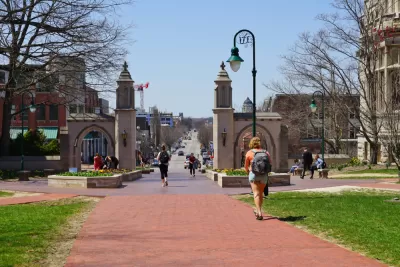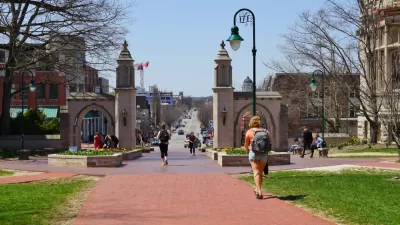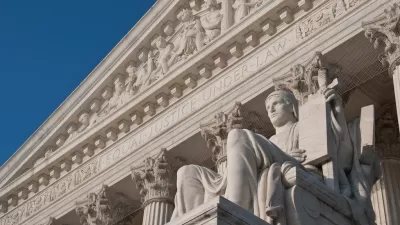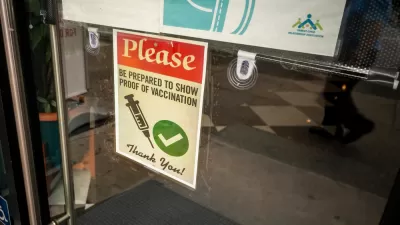The Supreme Court rejected a request brought by students to block Indiana University from requiring COVID-19 vaccinations. Students, faculty, and staff are required to be fully vaccinated by August 15.

A lawsuit filed by eight college students against Indiana University in June came to an abrupt end on Thursday night (August 12) after Associate Supreme Court Justice Amy Coney Barrett denied their request for emergency relief from a ruling issued ten days earlier by U.S. 7th Circuit Court of Appeal.
"People who do not want to be vaccinated may go elsewhere," wrote Judge Frank Easterbrook in the Aug. 2 decision. "He added that the university would have trouble operating if students were afraid that those around them were spreading disease," reported Arika Herron for the Indianapolis Star (via USA TODAY).
And the disease is spreading.
Barrett's decision comes as COVID cases, hospitalizations and deaths increase in most of the U.S. in what some are calling the Delta wave, named for the variant first identified in India. The Hoosier State has seen the daily average of cases increase by 125% in the last two weeks, hospitalizations by 71% and deaths by 85%, according to The New York Times coronavirus tracker on Aug. 13.
With 45% of the state population fully vaccinated, it is more vulnerable to the virus than most of the country which averages 50%.
The appeals court cited "a 1905 Supreme Court precedent, Jacobson v. Massachusetts, "that allowed Massachusetts to impose a penalty on those who declined smallpox vaccinations," wrote Kristine Phillips and John Fritze for USA TODAY in the source article.
Barrett's call
"Barrett, an appointee of President Donald Trump, is the circuit justice for the 7th Circuit, which covers Indiana," wrote Maeve Sheehey for Politico. She gave no reason for denying the emergency application for writ of injunction filed by the students' attorney, James Bopp Jr., on Aug. 6, which claimed that the vaccination requirement violates the students' "constitutional right to bodily integrity under the 14th Amendment," noted Phillips and Fritze.
"With a third ruling, now from the nation’s highest court, affirming Indiana University’s COVID-19 vaccination plan, we look forward to beginning fall semester with our health and safety policies in place," Indiana University said in a statement included in the source article.
The first ruling was on July 19 in the U.S. District Court of Northern Indiana reported by The Washington Post.
"U.S. District Judge Damon R. Leichty sided with the university in declining to issue an injunction after hearing oral arguments on July 13," wrote Nick Anderson, education reporter for the Post.
“Recognizing the students’ significant liberty to refuse unwanted medical treatment, the Fourteenth Amendment permits Indiana University to pursue a reasonable and due process of vaccination in the legitimate interest of public health for its students, faculty, and staff,” Leichty wrote in an opinion dated Sunday.
IU, with about 90,000 students on several campuses, is one of the most prominent public universities in a Republican-led state to adopt a vaccine mandate. Purdue University, also in Indiana, does not have a mandate.
As noted in Planetizen's first post on the litigation, Republican Attorney General Todd Rokita had expressed support for the students, citing state law.
Earlier vaccine mandate litigation
The students' appeal is the first case to come before the Supreme Court involving vaccine requirements. An earlier case brought by 117 health care workers at Houston Methodist Hospital was dismissed by the U.S. District Court for the Southern District of Texas on June 17.
Both cases fall into a theme that Planetizen has tagged public health vs. individual rights or freedom. The former won in these two cases, but in the case that actually went to the Supreme Court last November (see below), the latter won.
Related in Planetizen:
- Coronavirus Litigation: Students Sue University's Mandatory Vaccination Policy, June 28, 2021
- Coronavirus Litigation: Can Employers Require Employee Vaccinations? June 10, 2021
- SCOTUS: Freedom of Religion Trumps Public Health in a Pandemic, Nov. 29, 2020
Hat tip to KHN Morning Briefing.
FULL STORY: Supreme Court declines request by Indiana University students to block COVID-19 vaccine mandate

Planetizen Federal Action Tracker
A weekly monitor of how Trump’s orders and actions are impacting planners and planning in America.

Maui's Vacation Rental Debate Turns Ugly
Verbal attacks, misinformation campaigns and fistfights plague a high-stakes debate to convert thousands of vacation rentals into long-term housing.

San Francisco Suspends Traffic Calming Amidst Record Deaths
Citing “a challenging fiscal landscape,” the city will cease the program on the heels of 42 traffic deaths, including 24 pedestrians.

Defunct Pittsburgh Power Plant to Become Residential Tower
A decommissioned steam heat plant will be redeveloped into almost 100 affordable housing units.

Trump Prompts Restructuring of Transportation Research Board in “Unprecedented Overreach”
The TRB has eliminated more than half of its committees including those focused on climate, equity, and cities.

Amtrak Rolls Out New Orleans to Alabama “Mardi Gras” Train
The new service will operate morning and evening departures between Mobile and New Orleans.
Urban Design for Planners 1: Software Tools
This six-course series explores essential urban design concepts using open source software and equips planners with the tools they need to participate fully in the urban design process.
Planning for Universal Design
Learn the tools for implementing Universal Design in planning regulations.
Heyer Gruel & Associates PA
JM Goldson LLC
Custer County Colorado
City of Camden Redevelopment Agency
City of Astoria
Transportation Research & Education Center (TREC) at Portland State University
Jefferson Parish Government
Camden Redevelopment Agency
City of Claremont





























